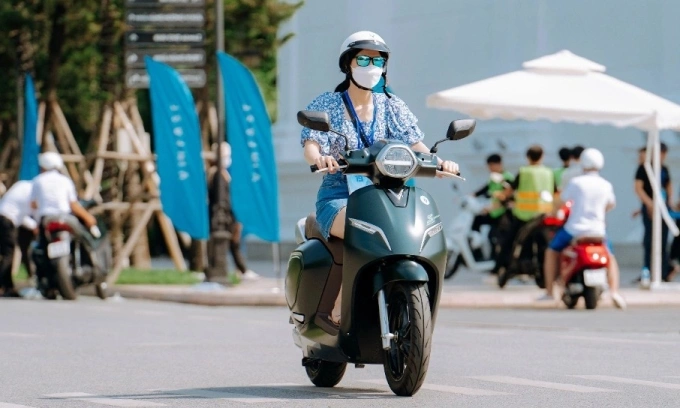Hanoi is set to ban gasoline two-wheel vehicles within its Ring Road 1, or most of the capital’s downtown areas, from July 1 next year.
The ban will expand to Ring Road 2 on January 1, 2028, and will include personal cars using fossil fuels.
By 2030 the restriction will extend to Ring Road 3, the outermost of the concentric ring roads.
HCMC, while yet to confirm a timeline for similar bans, is considering zones for prioritizing green vehicles and limiting gasoline and diesel cars and motorcycles in areas, including downtown the outlying area of Can Gio and the Con Dao Special Zone.
 |
|
A person drives a VinFast electric motorbike. Photo courtesy of VinFast |
The restrictions in Hanoi and HCMC could reshape Vietnam’s motorcycle market.
As the nation’s largest population centers with vibrant economies, the two cities are among the top consumers of motorcycles.
Electric bikes made an entry in the early 2000s, laying the foundation for the EV market, with students being the biggest consumers since they do not need a driver’s license for two-wheel EVs.
The bikes were mostly imported from China and affordable.
Detech, a local brand with a factory in the northern province of Hung Yen, was the only homegrown player.
After 2010 new brands emerged, mainly in northern Vietnam. Dibao was set up in 2011, Pega (formerly HKbike) in 2012, DK Bike in 2014, and Anbico in 2015. VinFast, with the backing of conglomerate Vingroup, entered the market in 2018.
The same year another local brand, Selex Motors, began selling its products. Dat Bike launched the following year.
In 2019 came Yadea of China, the world’s top-selling electric two-wheeler brand, establishing two large factories in the northern province of Bac Giang with ambitions to produce two million vehicles annually.
In 2024 another Chinese giant, Tailg, came, building a plant in Hung Yen with a capacity of 350,000 vehicles a year.
Traditional gasoline motorbike producers have also eyed the emerging market.
Japanese giant Yamaha launched its first electric motorcycle, the Neo’s, priced at VND50 million, in 2022.
Honda, the biggest motorbike seller in Vietnam with an over 80% market share, unveiled its first electric models in 2024.
The Honda ICON e:, priced at up to VND27.3 million, reached consumers in April this year, while the premium CUV e: is currently available only for lease.
Suzuki, SYM and Piaggio, the two remaining members of the Vietnam Association of Motorcycle Manufacturers, have yet to release fully electric models.
VinFast, the only manufacturer to release data, said it sold nearly 71,000 units last year, roughly equivalent to 3% of the five VAMM members’ gasoline motorcycle market of 2.65 million units.
Official statistics on annual electric motorcycle sales are unavailable.
In 2020 local brands held 70% of the market share, with VinFast leading the pack, according to the International Council on Clean Transportation (ICCT).
Policy boost
Industry analysts think Hanoi’s phased ban on gasoline motorcycles, and potentially HCMC’s, will profoundly change Vietnam’s motorcycle market.
The vehicle remains the main mode of transport due to factors like affordability, infrastructure and flexibility.
A 2022 ICCT study said two-wheel vehicles met 72.6% of transport needs in Hanoi and 82% in HCMC.
Honda, the country’s leading motorbike brand, said Hanoi accounted for 8-9% of its sales of almost 2.15 million units last year.
Policy changes in the capital would have major impact on the company, a Honda spokesperson said.
“The shift to eco-friendly vehicles in densely populated urban areas like Hanoi’s Ring Road 1 poses significant challenges.”
|
ICON e:, the first electric motorbike of Honda to be sold in Vietnam. Photo by VnExpress/Luong Dung |
Replacing such a large number of internal combustion engine vehicles within such a short period would create financial and logistical pressures, they said, adding that infrastructure like charging stations remains inadequate and fire safety, especially in some residential areas, remains a concern.
Honda wants the deadline deferred to develop technical standards, supportive policies and infrastructure to achieve effective and sustainable transition.
Other manufacturers have yet to outline clear responses to Hanoi’s ban.
A Suzuki Vietnam spokesperson said VAMM members would meet next week to discuss strategies for the transition to green vehicles.
Currently there are no government incentives for buying electric motorcycles, unlike the case of electric cars, for which registration fees are waived until February 2027.
Hanoi is studying ways to support the replacement of some 450,000 gasoline motorcycles and covering nearly all costs for new electric vehicles.
It is also planning charging zones for electric cars, motorcycles and other clean-energy vehicles.
VinFast leads in charging infrastructure investment across the country. Most other EV brands rely on home charging.
Dat Bike, a rare exception, has invested in charging stations, though currently only in HCMC.





